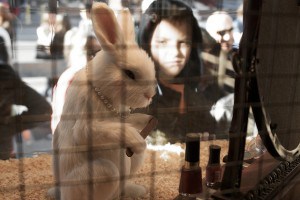
By: Amanda Froelich,
For marketing and scientific purposes, over 100 million animals in the US and 400 million in the UK are tested on each year. While it is common for many companies to test on animals for biological research or cosmetics development, the effectiveness and reliability of such experimentation has yet to be proven.
Such outdated method of research is unacceptable, especially considering that current statistics show 90% of drugs fail in clinical studies after accepted on animals. For the millions of dogs, cats, primates, horses, fish, and birds undergoing unnecessary torture, those with a voice need to speak up.
Thankfully, activists around the world have already been working hard to share these truths, and a new regulation was recently announced in China regarding animal testing laws.
Last month, the Chinese Food and Drug Administration announced it would loosen its regulations surrounding animal testing for cosmetics starting in June 2014.
While animal testing is legal in approximately 80% of the world, China is the only country where it is mandatory for all cosmetics and beauty products sold within its borders. The new legal adjustment does not ban the torturous form of research, but does at least limit domestically produced, “non specialized” cosmetics, such as shampoo, soap, and certain skin products.
Animal rights groups have worked hard for the past two years to eliminate mandatory animal testing, therefore the announcement was welcomed by many. David Neal, the director of Animal Asia, an animal welfare group, expressed surprise that the change happened so quickly.
In an interview with CNN, he commented, “That’s a very significant development because it took many years for the European Union to allow these products to be sold”. It was recently that the EU passed its own complete ban on animal testing in March 2013.
Up until now, cruelty-free companies have had limited opportunity to tap into China’s $22 billion cosmetics industry. But with the less harsh regulations, those interested in welfare of animals will be able to become more transparent. According to the Huffington Post, some companies got around the strict mandatory testing policy by telling consumers they only test on animals when necessary; or in other words, “they only test when financially advantageous to do so.”
While it’s realistic to assume some companies also do lie, those certified by Leaping Bunny have remained true to their principles.
This latest development foreshadows a positive shift in the cosmetics industry. Not only is bodily acceptance, environmentally friendly products, and green living becoming the mainstream ideal, but it is a necessary movement for the future. Often products free of animal testing are devoid of toxic ingredients, hormone disruptors, and carcinogenic promoting compounds, therefore they are beneficial for promoting longevity and health in humans while decreasing the suffering inflicted upon animals.
The ban has yet to be carried outby the Chinese FDA, but many are hopeful this is the first of many animal testing regulations to be changed in the near future.
Additional Sources:


